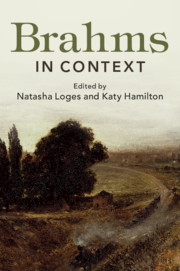Book contents
- Brahms in Context
- Brahms in Context
- Copyright page
- Dedication
- Contents
- Illustrations
- Music Examples
- Notes on Contributors
- Preface
- Abbreviations
- Part I Personality, People and Places
- Part II Identities, Environments and Influences
- Part III Performance and Publishing
- Part IV Society and Culture
- Chapter 26 Politics and Religion
- Chapter 27 Literature
- Chapter 28 Philosophy
- Chapter 29 Visual Arts
- Chapter 30 Science and Technology
- Part V Reception and Legacy
- Further Reading
- Index
- References
Chapter 29 - Visual Arts
from Part IV - Society and Culture
Published online by Cambridge University Press: 15 May 2019
- Brahms in Context
- Brahms in Context
- Copyright page
- Dedication
- Contents
- Illustrations
- Music Examples
- Notes on Contributors
- Preface
- Abbreviations
- Part I Personality, People and Places
- Part II Identities, Environments and Influences
- Part III Performance and Publishing
- Part IV Society and Culture
- Chapter 26 Politics and Religion
- Chapter 27 Literature
- Chapter 28 Philosophy
- Chapter 29 Visual Arts
- Chapter 30 Science and Technology
- Part V Reception and Legacy
- Further Reading
- Index
- References
Summary
Brahms was a man with wide cultural interests that ranged far beyond his musical practice, as evinced by his circle of friends, as well as the contents of his library. He had close relationships with several leading German artists and art historians of his time. Once he was financially stable, he accumulated a substantial collection of prints that included both modern and classical artists, focussing on German and Italian art (much like his musical interests, and in keeping with prevailing German tastes). He showed little interest in French contemporaries, despite the towering reputation of contemporary painters like Delacroix and Courbet. On a personal level, his interest in art was part of his general thirst for Bildung, or all-round cultural cultivation. Already in the late 1850s, he met Herman Grimm through Joseph Joachim. Grimm was a historian of art and literature, and his biography of Michelangelo (which Brahms owned and read) is still consulted today.
- Type
- Chapter
- Information
- Brahms in Context , pp. 286 - 295Publisher: Cambridge University PressPrint publication year: 2019

